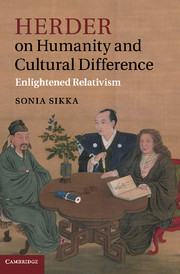Book contents
- Frontmatter
- Contents
- Acknowledgements
- Note on citation style
- Abbreviations and works cited by title
- Introduction
- 1 The question of moral relativism
- 2 Happiness and the moral life
- 3 History and human destiny
- 4 The concept of race
- 5 Language and world
- 6 The place of reason
- 7 Religious diversity
- Conclusion
- Bibliography
- Index
Introduction
Published online by Cambridge University Press: 03 May 2011
- Frontmatter
- Contents
- Acknowledgements
- Note on citation style
- Abbreviations and works cited by title
- Introduction
- 1 The question of moral relativism
- 2 Happiness and the moral life
- 3 History and human destiny
- 4 The concept of race
- 5 Language and world
- 6 The place of reason
- 7 Religious diversity
- Conclusion
- Bibliography
- Index
Summary
Johann Gottfried Herder is commonly regarded as a founding father of the view that each of the world's many nations has a specific and uniquely valuable character, expressed in the various facets of its collective life: its language and literature; its religion, traditions, and customary practices; its values, institutions, and laws. He is therefore frequently mentioned in works dealing with culture or ethnicity, and it is rare to find any extended work on the subject of cultural nationalism that does not allude to the influence of his ideas. Unfortunately, at the same time, he has become one of those authors, not uncommon in history, whose writings are seldom studied in depth or detail, when they are read at all, in spite of the fact that his name is regularly used as a placeholder for a certain roughly defined position. Bhikhu Parekh labels this position “culturalism” (Parekh 2006, 10), a suitably vague term for a host of loosely connected ideas. As a culturalist, Herder is thought to have held the relativistic thesis that the value systems of different societies are incommensurable and equally valid, because there is no common human nature and therefore no basis for postulating universal ethical principles. He is also thought to have believed that peoples form homogeneous organic units, intimately connected to a native geography and bound together by a shared language.
- Type
- Chapter
- Information
- Herder on Humanity and Cultural DifferenceEnlightened Relativism, pp. 1 - 11Publisher: Cambridge University PressPrint publication year: 2011

